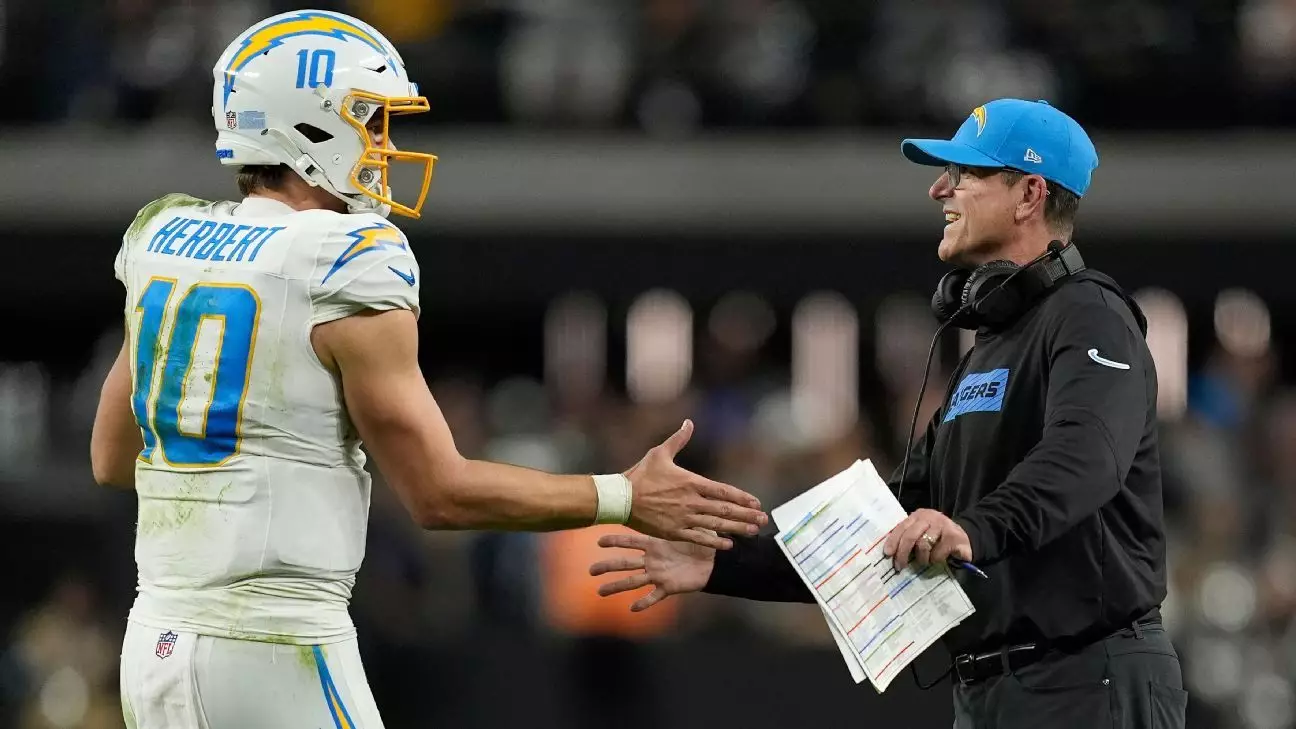The narrative surrounding Justin Herbert’s recent playoff woes is becoming a topic of heated discussion among fans and analysts alike. After a disappointing performance where he threw four interceptions in a 32-12 wild-card playoff loss to the Houston Texans, many are quick to place blame squarely on his shoulders. However, this response raises an important question: how much responsibility truly lies with the quarterback versus the structures around him? With the weight of expectations on Herbert’s shoulders, it is essential to examine the components contributing to his lackluster postseason outings, particularly in light of Coach Jim Harbaugh’s candid admission of fault.
Herbert entered the game having established himself as one of the top quarterbacks in the NFL, boasting the fewest interceptions during the regular season. Despite this impressive statistic, his performance against the Texans starkly contrasted with his usual capabilities. Early mistakes set a negative tone; one particularly glaring misstep occurred when he attempted to throw across his body, resulting in an interception that shifted momentum. That kind of decision-making is uncharacteristic and suggests that Herbert might have been pressured into poor choices under the weight of expectation.
A closer analysis reveals that Herbert’s play style combines risk-taking and precision, but in this game, the risks overshadowed the precision. This perfect storm of circumstances, including poor decision-making and an ineffective game plan, raises the question: are these lapses indicative of a larger issue within the Chargers’ strategy or simply a moment of weakness for a young quarterback?
While the quarterback undoubtedly plays a pivotal role in the outcome of any game, coaching strategies also significantly affect performance. Harbaugh’s acknowledgment that he and his staff did not equip Herbert with suitable protection against the Texans’ pass rush is critical. Being pressured on 50% of his dropbacks is no easy feat for any quarterback, and Herbert ended up being sacked four times. This level of pressure not only impacts a player’s performance but also alters the decisions they might make under duress. It becomes a chicken-and-egg scenario: does poor play lead to an inadequate game plan, or is an ineffective game plan what leads to poor performance?
Moreover, the Chargers’ lack of pragmatic strategies regarding offensive line protection demonstrated a disregard for Herbert’s strengths. Just as crucial as a quarterback’s passing ability is the offensive line’s ability to give him time in the pocket. Had the game plan been more comprehensive, perhaps not all blame would have fallen on Herbert.
General Manager Joe Hortiz’s defense of Herbert speaks volumes about the potential pitfalls of scapegoating a young quarterback based on limited playoff experience. He cited other great quarterbacks, such as Peyton Manning and Lamar Jackson, who faced criticism early in their careers but eventually transformed their playoff narratives. This begs the broader question about the expectations we place on young talent in high-stakes environments. Just as those quarterbacks evolved, so too should our understanding of player development and the long-term growth of skills, especially under pressure.
Hortiz’s confidence in Herbert should resonate with fans and critics aiming to attribute Herbert’s playoff struggles to personal shortcomings. We often overlook that many factors contribute to a quarterback’s performance, including organizational strategy, coaching methodologies, and even external circumstances that can disrupt a player’s concentration or flow.
As Herbert continues on his journey, it is imperative that both he and the coaching staff take this critical moment as a learning opportunity. If the narrative surrounding his abilities is to transition from constructive criticism to that which fosters growth, the Chargers must prioritize creating a supportive environment—one that allows Herbert to learn from his missteps without bearing the entire brunt of criticism.
While Herbert’s recent playoff performance has drawn deserved scrutiny, it’s equally important to reflect on the broader context of that game. The interplay between a young quarterback’s development, the inadequacies of the game plan, and external pressures forms a complex narrative. Moving forward, a unified front within the organization prioritizing both player growth and strategic refinement will be essential for success in future postseason endeavors.


Leave a Reply